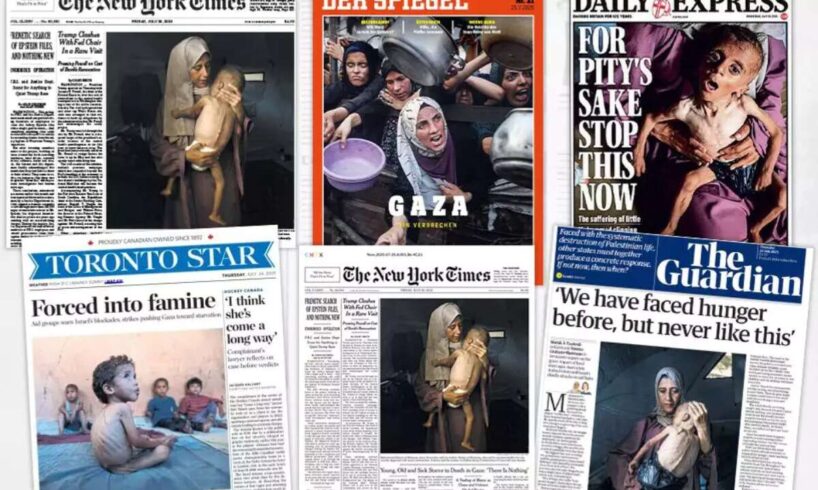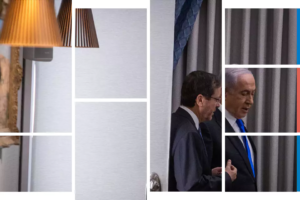
On March 2, following the end of the first phase of the hostage release deal and a temporary ceasefire, the Israeli government ordered a halt to humanitarian aid entering Gaza. Since then, developments on the ground and in the global media have severely damaged Israel’s image, foreign relations, and international standing, arguably more than at any point in its history or at least in recent decades.
On May 26, the Gaza Humanitarian Foundation (GHF) began operations in the Strip, amid growing discourse on the humanitarian crisis. However, the foundation’s work quickly descended into chaos. Failing to improve conditions on the ground, the escalating violence at aid distribution points became a mounting diplomatic liability.
The first major incident occurred on June 1, when, according to Hamas’ health ministry, 31 Palestinians were killed. The IDF later stated its soldiers were not involved. Additional incidents, including IDF admissions of fire near distribution points, eroded trust in the military’s statements. On Tuesday, the United Nations claimed that 1,054 Palestinians had been killed near GHF aid facilities or in related incidents.
Public Opinion Erosion
An attack on a GHF bus transporting workers home, where five were murdered by Hamas and others abducted, received little international attention. Headlines were instead dominated by the resignation of senior GHF officials, the foundation’s suspension in Switzerland, and reports of its chaotic operations, including irregular and unpredictable distribution times. These issues did little to alleviate suffering in Gaza.
Hungry Gazans. The front page of Der Spiegel
Israeli leaders’ rhetoric and plans further fueled global criticism. Defense Minister Israel Katz’s proposal for a “humanitarian city” in the al-Mawasi area, intended to initially house 600,000 Palestinians and eventually the entire population of Gaza, sparked outrage. Katz said Palestinians would not be allowed to leave once relocated and would be encouraged to emigrate elsewhere.
Recently, Heritage Minister Amichai Eliyahu said “The government is moving toward wiping out Gaza,” and added, “Thank God, we are erasing this evil.” On the issue of famine in Gaza, he remarked, “We don’t need to worry about hunger in the Strip. Let the world handle that.”
Despite strong backing from the Trump administration and high-level visits to Washington, public support in the US has also waned, including among conservative voters. Three incidents perceived as harming Christians worsened the situation: the killing of a Palestinian-American during a clash with settlers; errant Israeli fire damaging a church in Gaza (prompting an angry phone call from Trump to Prime Minister Benjamin Netanyahu); and an arson attack near a church in Taybeh that led Ambassador Mike Huckabee to visit the site. Even traditional Israel allies, such as Senator Lindsey Graham, voiced public criticism.
The New York Times’ main article
Since March, global pressure on Israel has been building. On May 20, European Union foreign ministers opened an investigation into possible Israeli human rights violations. The resulting report concluded there were “indications” of wrongdoing. Mid-month, a sanctions proposal against Israel failed shortly after a deal with the EU to resume aid delivery to Gaza.
Starving babies
Had the vote taken place a week later, the outcome might have changed. “The killing of civilians seeking aid in Gaza is indefensible,” Estonian Prime Minister Kaja Kallas said last week after speaking with Foreign Minister Gideon Sa’ar. “I made it clear that the IDF must stop killing people at aid distribution points. All options remain on the table if Israel fails to uphold its commitments.”
Last week, images of starvation in Gaza dominated global front pages: malnourished children at aid lines, babies with exposed ribs and paper-thin skin. One image stood out: 18-month-old Muhammad al-Matouq, held by his mother and wrapped in a diaper made from a trash bag. The photo appeared on CNN, The New York Times, The Guardian, BBC, and even the conservative British tabloid Daily Express.
The British Guardian
Independent journalist David Collier published evidence suggesting al-Matouq had been ill since birth. However, even if true, such explanations, previously offered and possibly accurate, have done little to sway global public opinion. The international community views Gaza’s most vulnerable as the conflict’s primary victims. The soaring food prices in the Strip reflect a widespread, systematic crisis, as documented by numerous testimonies and photos.
A YouGov poll published in early June, before most of the violent events of June and July, showed the extent of Israel’s image crisis in Western Europe. In countries like the UK, France, Germany, Denmark, Italy, and Spain, only 13–21% of respondents viewed Israel favorably, while 63–70% viewed it negatively.
Across the world, including among moderate and centrist populations, a significant shift in opinion against Israel is taking shape, and politicians in those countries are merely reflecting that growing sentiment.





